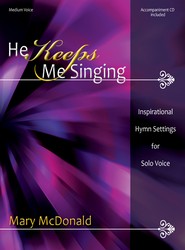- |
User Links
I Know Not Why God's Wondrous Grace
Hymn Information
- First Line
- I know not why God's wondrous grace
- Author
- Daniel W. Whittle (1883)
- Tune Name
- EL NATHAN
- Composer
- James McGranahan (1883)
- Topic
- Faith · Holy Spirit · Jesus Christ: Grace · Jesus Christ: Redeemer · Elements of Worship: Forgiviness and Grace
Copyright Information
- Text Copyright
- Public Domain
- Tune Copyright
- Public Domain
- Reprint/Projection Information
- Words and Music: The Words and Music are in the Public Domain; you do not need permission to project or reprint the Words and Music.
Full Text
Scripture References
Further Reflections on Scripture References
American evangelist Daniel Webster Whittle (b. Chicopee Falls, MA, 1840; d. Northfield, MA, 1901) wrote this text based on 2 Timothy 1:12, which is quoted in the refrain (King James Version). It was published with EL NATHAN in Gospel Hymns No.4 (1883).
The text contrasts the "I know not" stanzas with the certainty of the "I know" refrain We cannot understand God's saving grace to us (st. 1); we cannot explain our spiritual birth (st. 2); we are unable to comprehend the work of God's Spirit (st. 3); and we dl not perceive clearly the future of our earthly lives (st. 4). But we do know by faith that God is true to his word!
Bert Polman, Psalter Hymnal Handbook
Confessions and Statements of Faith References
Further Reflections on Confessions and Statements of Faith References
The Catechism says that those who know Christ’s forgiveness are “to thank God for such deliverance” (Heidelberg Catechism, Lord’s Day 1, Question and Answer 2). As a result, “With our whole lives we may show that we are thankful to God for his benefits, so that he may be praised through us, and that we may be assured of our faith by its fruits, and so that by our godly living our neighbors may be won over to Christ” (Heidelberg Catechism, Lord’s Day 32, Question and Answer 86).
I Know Not Why God's Wondrous Grace
Additional Prayers
I Know Not Why God's Wondrous Grace
Tune Information
- Name
- EL NATHAN
- Key
- D Major
- Meter
- 8.6.8.6 refrain 9.10.8.7


 My Starred Hymns
My Starred Hymns






